Choosing the right EHR software for small practices can feel overwhelming. Large EHR systems are often designed for hospitals or larger organizations, packed with features you don’t need and costs you can’t sustain. Small practices need something different: affordable, user-friendly, and focused on practice management without unnecessary complexity.
A good electronic health records (EHR) system should streamline your clinical workflow, improve practice efficiency, and ultimately enhance patient care.
This guide compares the top EHR systems tailored for solo practitioners and small practices, so you can find a practice management solution that balances affordability, compliance, and functionality.
What Small Mental Health Practices Need in EHR Software
Your EHR software choice directly impacts your practice efficiency, compliance, and growth potential. Small practices face unique constraints that require careful consideration of key features versus complexity.
Essential Features
When evaluating EHR software, small practices should prioritize:
- HIPAA compliance and strong patient data security
- Affordable pricing that scales with patient volume (typically $35–$60/month)
- Integrated scheduling, medical billing, and patient portal access
- Clinical documentation tools with customizable templates
- Built-in patient engagement tools like secure messaging and telehealth capabilities
Challenges for Small Practices
Unlike larger organizations, independent practices face unique constraints:
- Tight budgets: Limited funds mean every software investment must deliver clear ROI.
- Minimal IT support: No dedicated tech teams to handle complex implementations or maintenance.
- Time constraints: Long training or setup periods disrupt patient care and clinic workflows.
- Risk of feature overload: Large EHR systems often come with unnecessary tools that add cost and complexity.
- Scalability concerns: Many platforms either don’t scale as the practice grows or become too expensive as patient volume increases.
Top 5 EHR Software for Small Practices
Choosing the right EHR systems requires balancing functionality, affordability, and ease of use for small practices. Here are some of the leading EHR systems trusted by small practices, each balancing cost, compliance, and functionality differently depending on your size, workflow, and patient needs.
1. SimplePractice
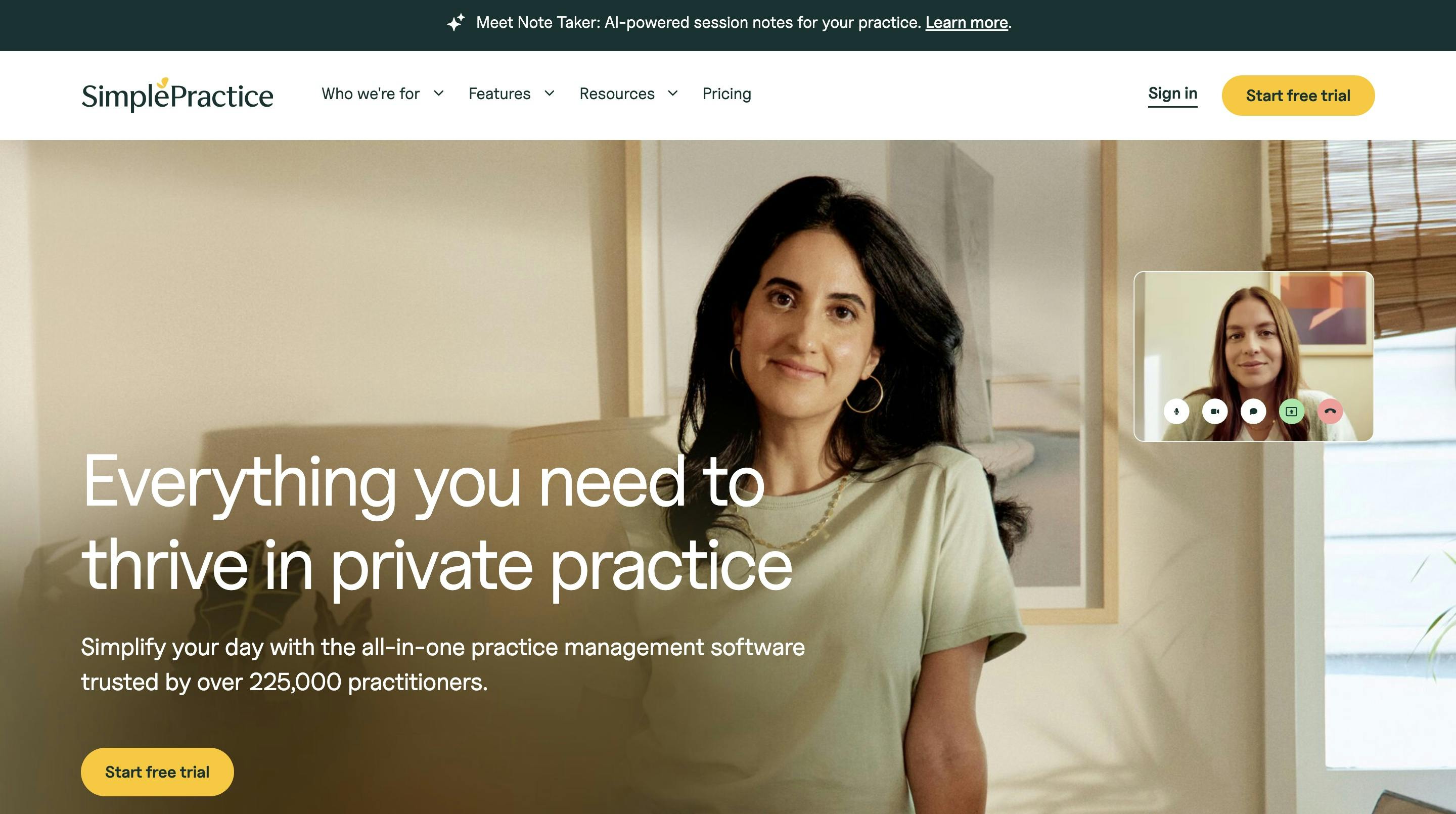
SimplePractice stands out as one of the most comprehensive yet user-friendly interface solutions designed specifically for healthcare professionals in mental health. The practice management solution combines clinical documentation, patient engagement tools, and patient information systems in one streamlined platform.
- All-in-one solution covering scheduling, medical billing, notes, and patient portal functionality
- Built-in telehealth capabilities with HD video quality and session recording
- Automated appointment reminders and online booking for enhanced patient care
- Customizable templates for different therapy modalities and clinical documentation needs
- Insurance claim processing and payment collection tools for medical practices
- Mobile app for on-the-go access to patient records and health data
Pricing: It starts at $14.70/month for Starter, $23.70/month for Essential, and $29.70/month for Plus, billed monthly with a free trial and 70% off for the first 3 months.
Best suited for: Solo practitioners and small practices seeking an integrated EHR without complexity
2. TherapyNotes
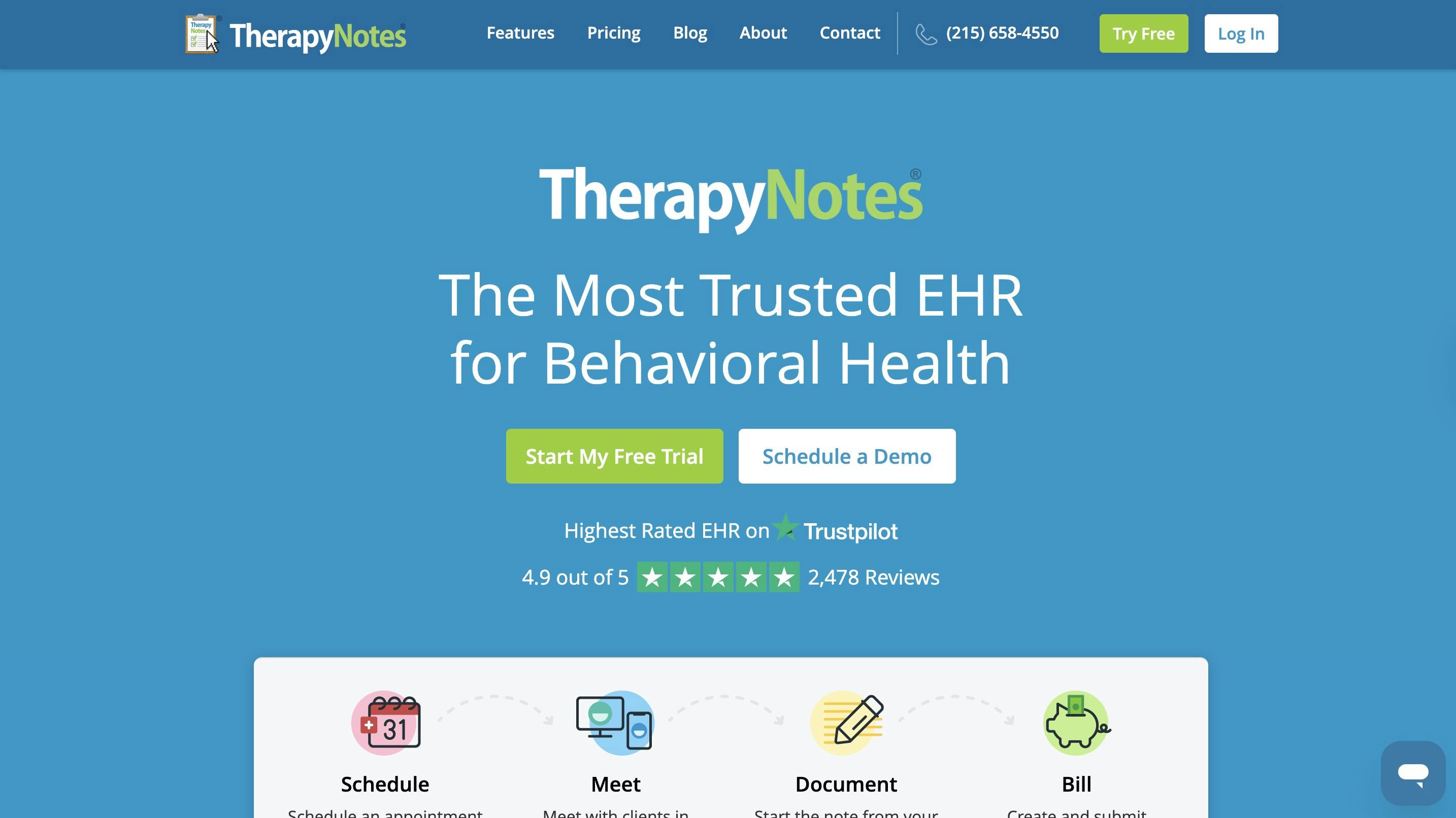
TherapyNotes caters to practices that prioritize clinical depth and thorough documentation. This electronic health records platform excels in supporting evidence-based treatment approaches and detailed clinical workflow processes.
- Robust clinical documentation with built-in treatment plans capabilities
- Comprehensive medical billing with real-time eligibility verification for streamline workflows
- Outcome measurement tracking and progress monitoring tools for better patient care
- Group therapy scheduling and billing solution features
- Advanced reporting for clinical and financial metrics across medical practices
- HIPAA-compliant secure messaging and patient portal access
Pricing: Starts at $59/month for solo practitioners, $69/month for the first clinician in group or enterprise plans (+$40/month per additional clinician).
Best suited for: Practices focused on clinical depth, outcome tracking, and comprehensive care coordination
3. TheraNest
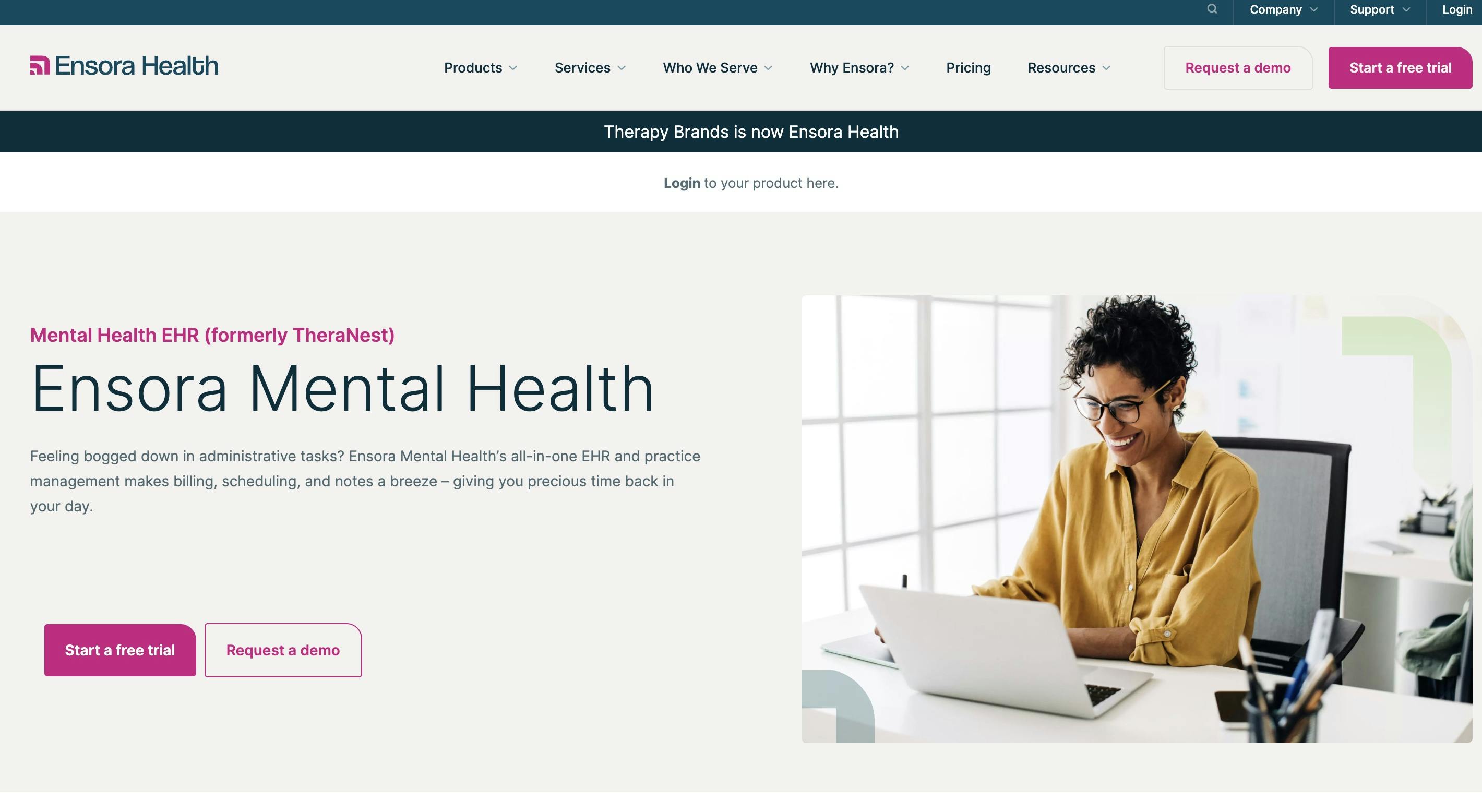
TheraNest offers strong practice management features with particular strength in supporting diverse service offerings. The EHR software adapts well to practices that provide multiple types of therapy services for improved practice efficiency.
- Flexible practice management with multi-location support for independent practices
- Excellent group therapy scheduling and electronic medical records documentation
- Customizable workflows and clinical templates for various therapy modalities
- Automated billing and payment processing to save time on administrative tasks
- Patient portal with secure messaging and document sharing capabilities
- Inventory management for testing materials and clinical resources
Pricing: Starts at $27/month (Essentials), $54/month (Advanced), and $82/month (Premier)- billed annually with one month free.
Best suited for: Growing practices offering diverse services like individual, group, family, and couples therapy
4. Valant
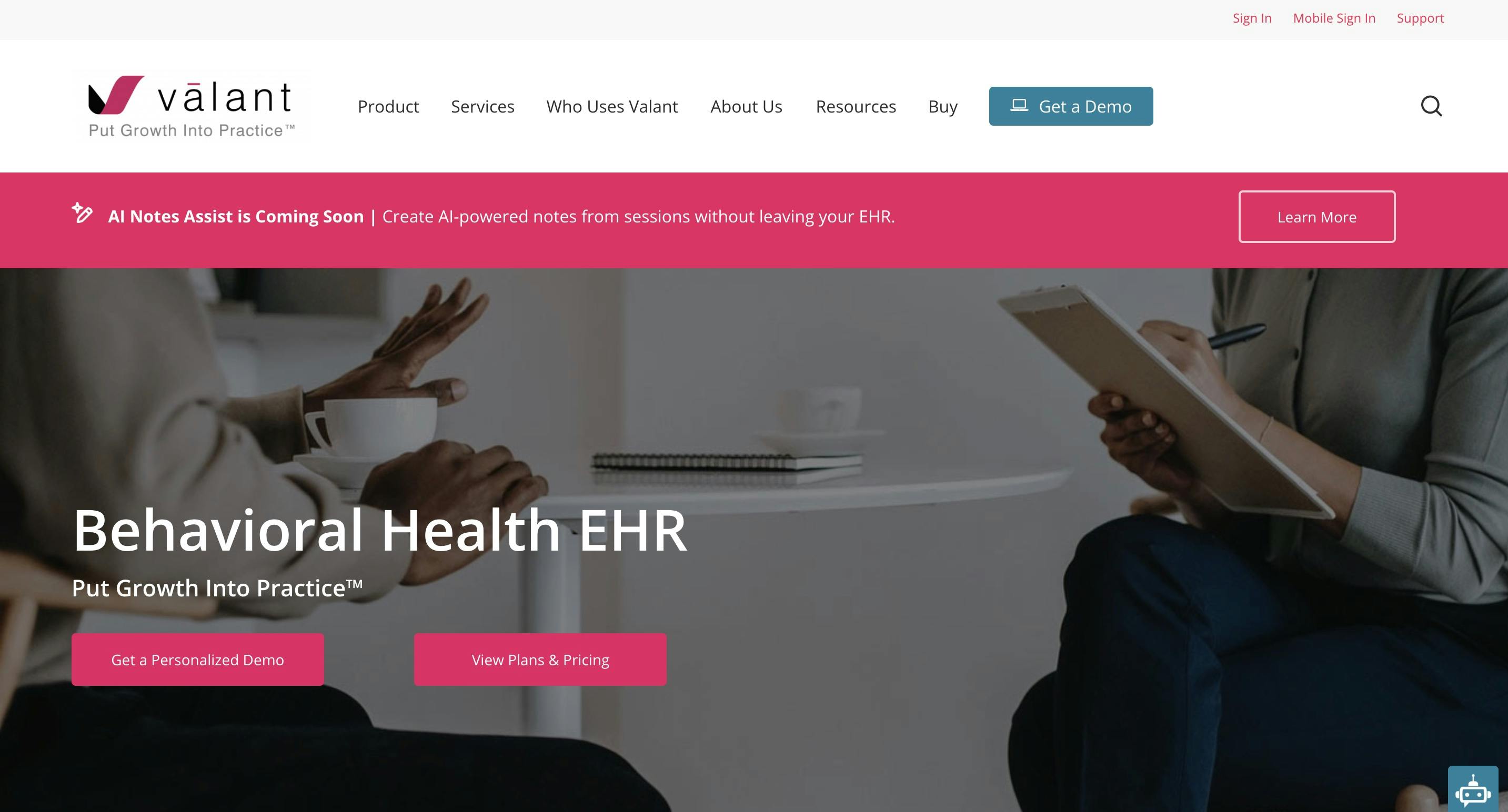
Valant specializes exclusively in behavioral health with enterprise-level key features scaled for smaller healthcare organizations. The cloud based platform emphasizes data-driven care and outcome measurement for healthcare providers.
- Specialized behavioral health workflows and clinical terminology
- Advanced outcome measurement and assessment tools for comprehensive patient experience
- Robust reporting and analytics dashboard for practice insights
- Integration with psychological testing platforms and lab results systems
- Population health management features for value based care initiatives
- Clinical decision support tools to enhance patient care quality
Pricing: Custom pricing
Best suited for: Data-driven practices focused on outcome measurement and clinical analytics
5. ICANotes
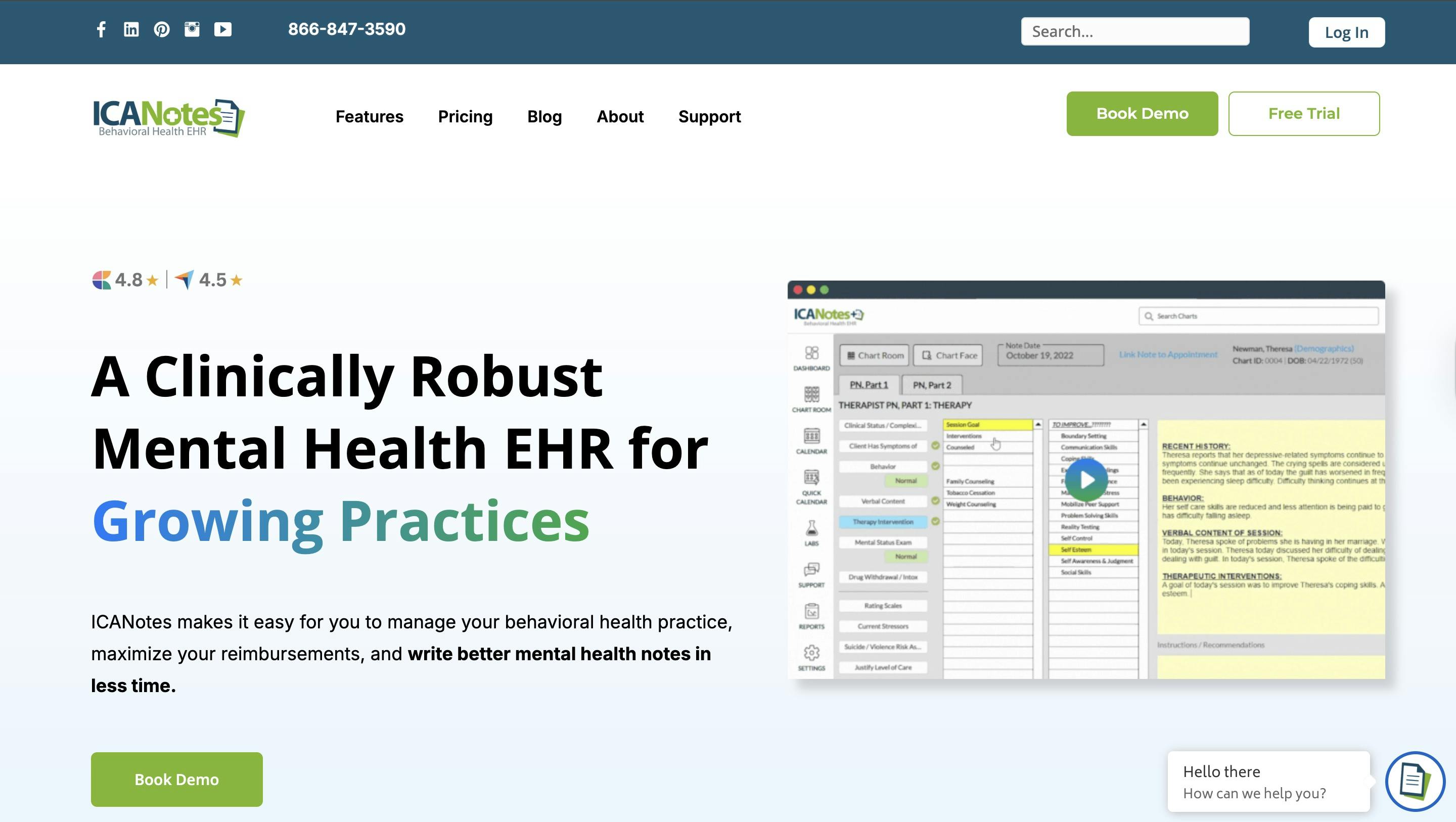
ICANotes prioritizes simplicity and speed for solo practitioners who want straightforward documentation without extensive practice management features. This best EHR option focuses on reducing documentation time while maintaining quality.
- Clean, minimalist interface designed for quick navigation and improved efficiency
- Rapid note creation with smart templates and shortcuts to save time
- Basic scheduling and patient information management tools
- Simple billing and payment tracking for small practices
- Mobile-optimized for tablet and smartphone use across different devices
- Quick session note completion in under 5 minutes for busy healthcare professionals
Pricing: It starts at $55/month (Notes Only), $75/month (Non-Prescribing), and $213/month (Prescribing), billed monthly.
Best suited for: Solo practitioners who prioritize simplicity and fast documentation over comprehensive features
EHR Software Comparison for Small Mental Health Practices
The following table compares top EHR software options for small mental health practices and AI documentation tools that can enhance your chosen system.
EHR Software | Starting Price | Best For Small Practices |
|---|---|---|
SimplePractice | $14.70/month | All-in-one solution with telehealth and client portal |
TheraNest | $39/month | Growing practices with group therapy features |
ICANotes | $55/month | Solo practitioners wanting simple interface |
TherapyNotes | $59/month | Practices needing robust clinical documentation |
Valant | Contact for quote | Data-driven practices with outcome measurement needs |
While the EHR provides your practice foundation, adding specialized AI documentation tools can reduce note-writing time by 60-80%, allowing you to focus more on patient care while maintaining compliance and quality documentation.
Enhancing Your EHR with AI Documentation Tools
Adding AI documentation tools to your existing EHR systems for small practices can dramatically reduce administrative burden while improving note quality.
Why AI Documentation Matters?
AI documentation tools can cut your note-writing time by 60-80%, transforming what used to take 20-30 minutes into a 5-minute task. This means you can see more patients or simply reclaim hours in your day for actual therapy work.
These tools also improve consistency across your electronic health records. They follow the same structure and include relevant clinical details every time, reducing the risk of missing important patient information that insurance companies or licensing boards expect to see.
Leading AI Documentation Solutions
Supanote offers native integration with popular EHR systems and focuses specifically on mental health documentation.
- Pricing: Starting at $19.99/month for 40 notes
- Key features include built-in customizable templates for therapy-specific needs
- Best suited for: Healthcare providers wanting seamless practice management solution integration
Mentalyc uses a template-based approach that works with any electronic health system through simple copy-paste functionality.
- Pricing: Starting at $14.99/month for 40 notes
- Offers SOAP and DAP note formats
- Best suited for: Medical practices wanting flexible documentation formats
Upheal combines session recording with AI analysis to generate comprehensive patient records.
- Pricing: Free basic plan, Plus at $19/month
- Includes built-in session recording capabilities
- Best suited for: Healthcare professionals comfortable with session recording
Choosing mental health-specialized AI tools ensures your clinical documentation meets standards while integrating smoothly with your existing practice management workflow.
Key Considerations for Small Practices
Choosing the right EHR software can make or break efficiency for a small or independent practice. Unlike larger organizations that can absorb inefficiencies, small practices need systems that fit seamlessly into daily routines without adding extra administrative burden.
Here are the factors you should weigh before making a decision:
- Patient Volume and Practice Size
Start with the basics - How many patients do you typically see per week? A solo practitioner may need a lightweight EHR service with easy charting and scheduling, while a small group practice might require advanced practice management solutions that handle multi-provider workflows. - Billing Model and Revenue Cycle Needs
If you rely heavily on insurance reimbursements, look for EHR systems with strong medical billing and claims management features. For self-pay or hybrid practices, flexibility in invoicing and payment collection will matter more than complex payer integrations. - Scalability and Growth Potential
Your electronic health records system should not only meet today’s needs but also scale with you as you add more clinicians, expand into telehealth, or increase your patient base. An all-in-one platform with modular add-ons helps future-proof your investment. - Ease of Use and Daily Workflow Fit
Even the most advanced EHR software is useless if your team finds it clunky. Test how intuitive the user-friendly interface really is—are templates customizable, can you quickly access a patient’s chart, and does it actually save time compared to paper or older systems? - Patient Engagement and Experience
In a small practice, every patient interaction counts. Look for systems that offer patient portals, secure messaging, appointment reminders, and even telehealth capabilities. These tools not only improve satisfaction but also free up admin time for your staff. - Compliance, Security, and Data Protection
With limited IT resources, small practices must rely on the vendor’s ability to ensure data privacy and meet HIPAA compliance standards. Cloud-based, fully encrypted systems can reduce your liability while ensuring patient data is safe.
In short: think beyond flashy features. The best EHR for small practices is one that balances practice efficiency, compliance, and exceptional patient care, while still being affordable and easy to implement.
Making the Right Choice for Your Practice
Selecting the right EHR software for small practices requires a systematic approach that goes beyond essential features lists and pricing comparisons.
Decision Framework
Start by assessing your current patient volume and realistic growth projections for the next 12-24 months. This determines whether you need a comprehensive solution that scales easily or one optimized for independent practices.
Evaluate how the EHR service will integrate with tools you already use, such as accounting software, existing scheduling systems, or patient portal platforms. Factor in the total cost, including add-ons like extra users, storage, or premium features you’ll likely need.
Implementation Tips
Always start with free trials when available—most reputable platforms offer 14-day trials that let you test real workflows. Plan for 2-4 weeks of reduced practice efficiency while you and your staff learn the new system.
- Test your actual documentation workflows during the trial period
- Import a small sample of patient data to test functionality
- Try scheduling, medical billing, and note-taking processes you use daily
- Consider a gradual migration approach rather than switching everything at once
The right EHR choice balances your current needs with room to grow, without overwhelming your practice with unnecessary complexity or costs.
Frequently Asked Questions
Q.NWhat’s the minimum budget I should expect for EHR software as a solo practitioner?
A. Plan for $35-60 per month for basic EHR systems functionality. This covers essential features like scheduling, clinical documentation, and medical billing. Additional costs may include payment processing fees and advanced features for enhanced patient care.
Q. Can I switch EHR systems without losing my patient data?
A. Yes, most reputable electronic health records providers offer data migration services for medical practices. However, the process can take several weeks and may involve temporary downtime. Always request a detailed migration plan before committing to a new health record system.
Q. Do I need separate software for telehealth if my EHR doesn’t include telehealth capabilities?
A. Not necessarily for small practices. Many modern electronic health records like SimplePractice include built-in virtual visits features. If your current EHR service lacks this, consider upgrading to a comprehensive solution rather than managing multiple platforms, which can complicate clinical workflow and increase costs.
Q. How long does it typically take to fully implement a new electronic medical records system?
A. Expect 2-4 weeks for basic setup and staff training for healthcare providers. Full optimization, including customizable templates and clinical workflow adjustments, usually takes 1-2 months. Plan for reduced practice efficiency during the initial transition period.
Q. Are cloud based platform EHR systems safe for mental health patient records?
A. Yes, when properly configured for healthcare professionals. Look for top EHR systems with HIPAA compliance, end-to-end encryption, and regular security audits. Cloud based systems often provide better security than local servers that independent practices manage themselves.
Q. Should I prioritize medical billing features or clinical documentation in my best EHR choice?
A. Focus on clinical documentation first, as it’s used daily and affects patient care quality. Basic billing solution features are sufficient for most small practices. You can always integrate with specialized revenue cycle management services later if needed.
Q. Can I customize EHR templates for different therapy modalities?
A. Most quality electronic health systems offer customizable templates for medical practices. Look for platforms that allow you to create specific templates for CBT, DBT, family therapy, or other modalities. This saves significant documentation time and streamlines workflows.
Q. What happens if my EHR provider goes out of business?
A. Choose established healthcare providers with strong financial backing and clear patient data retention policies. Always maintain local backups of critical patient information and medical history. Most reputable providers offer data export options and transition assistance if needed.
Conclusion
The perfect EHR software for small practices balances affordability, key features, and ease of use for your specific practice size. Start with free trials to test how each integrated EHR fits your clinical workflow and enhances patient care.
Remember that combining a solid practice management solution with AI documentation tools can dramatically improve efficiency and patient experience. The right technology investment today sets the foundation for sustainable growth and exceptional patient care tomorrow.
Choose your electronic health records system based on your current needs while considering your practice’s future direction. Focus on solutions that save time, streamline workflows, and improve patient care quality. The best EHR systems will grow with your practice while maintaining the user friendly interface that keeps you focused on what matters most, your patients.


